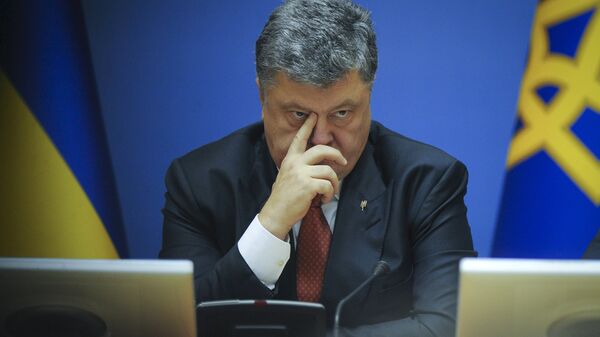Ukraine is facing a moment of truth. Its politicians are haggling over whether or not to pass legislation implementing the Minsk accords while the country keeps burning.
The Minsk accords (also known as Minsk II) were signed in Belarus’ capital in February 2015 by Ukrainian president Petro Poroshenko and representatives of the rebel Donetsk and Lugansk republics, as well as by France, Germany and Russia as the guarantors. Following the latest bout of hostilities between the self-proclaimed republics and the Kiev forces, the accords aimed to lay a foundation for ending Ukraine’s ongoing civil war and for Donbass reintegration into Ukraine. As part of the deal Kiev agreed to introduce a form of home rule in the region. That called for passing special legislation, including, if necessary, amending the Constitution.
Now some factions of the post-Maidan government are vehemently attacking the Minsk accords and personally Poroshenko. They brand the accords a sell-out to Moscow, claiming them to be part of a sinister plan to dismember Ukraine.
By opposing the Minsk accords the Maidan politicians are making a mistake. Ending the war as soon as possible is in Ukraine’s interests. So Kiev should fully embrace the agreements and do all it can to implement them in short order. After almost two years of the war and devastation unleashed by the post-Maidan authorities upon the Donbass, Kiev should now be going out of its way to seek reconciliation. Should its politicians fail to exercise the requisite leadership, they may risk losing not only the Donbass, but the entire Ukraine.
If the Minsk accords fail, Ukraine will likely forgo the Donbass for good, sliding instead into a shooting war or getting stuck with a permanent frozen conflict. If the conflict escalates, Russia may have no choice but to recognize the republics. Also, as time passes, the gulf between the Donbass and Ukraine will grow wider, thus making a reunion increasingly unlikely. The simmering conflict may also encourage separatism in the territories still under Kiev control.
Absent a settlement in the East, Ukraine’s chances of moving closer to Europe, something that the post-Maidan Kiev is ostensibly seeking, would diminish. Relations with the West will worsen as Ukraine would be seen as a failed state.
Without a peace Ukraine would in time likely face an economic collapse as trade and investment will deteriorate further. Ukraine will also miss a chance to improve its relations with Russia, something that must happen sooner or later. The country just can’t afford an antagonistic relationship with its largest and most important neighbor.
Finally, by opposing the Donbass settlement the radical Maidan politicians are engineering their own downfall. The the voters will surely throw them out of office if all of the above happens.
So what makes these politicians engage in such irresponsible brinkmanship?
It may be that they misunderstand the nature and roots of the Ukrainian conflict, blaming it as they are on foreign machinations rather than on deep-seated domestic problems. But it’s more likely that they are simply trying to gain a narrow partisan advantage by pandering to a small but militant segment of Ukraine’s population subscribing to the notion “Ukraine for Ukrainians”. They will likely not succeed in their stated goal of spiking the Minsk accords. Yet they can delay their implementation, causing much harm in the process.




